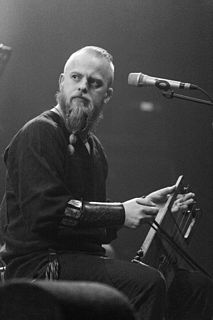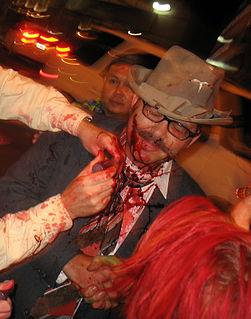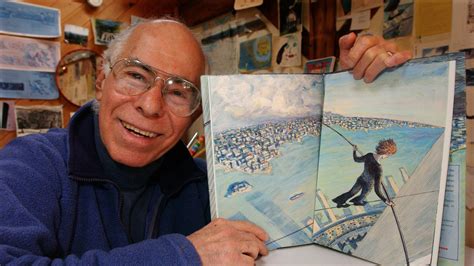A Quote by Joe Morton
What you find with really good directors is that they kind of leave you alone. They've hired you because they know the kind of work you do and the sense of how you'd approach it. So usually, they'll just stand back and maybe give you a nudge once in a while in terms of something specific they might want in a particular scene.
Related Quotes
It's not really about asking for the raise but knowing and having faith that the system will actually give you the right raises as you go along. And that, I think, might be one of the additional superpowers that, quite frankly, women who don't ask for raises have. Because that's good karma. It'll come back. Because somebody's going to know: 'That's the kind of person that I want to trust. That's the kind of person that I want to really give more responsibility to.'
When I write a project, it might be something that I want to do and then when I look at it, I'm actually like, "I kind of don't want to direct it." I don't know why, I still love it enough for it to be made and to support it, but I don't want to direct it. I just give it to other directors and they do a good job!
I always feel like I learn more from directors that are new, and I also am able to understand how much I really do know about filmmaking when you work with directors that maybe don't have as much experience, so you're able to sort of take the reins. I know how to do these movies, I've done so many of them and have learned from new directors who are usually willing to try new things and are more open to allowing someone like me to kind of come in and just do what I know how to do.
If you're a poet, you do something beautiful. I mean, you're supposed to leave something beautiful after you get off the page and everything. The ones you're talking about don't leave a single, solitary thing beautiful. All that maybe the slightly better ones do is sort of get inside your head and leave something there, but just because they do, just because they know how to leave something, it doesn't have to be a poem for heaven's sake. It may just be some kind of terribly fascinating, syntaxy droppings--excuse the expression. Like Manlius and Esposito and all those poor men.
There are the obstacles of your position as an actor, not being a commodity enough to be hired by the big directors for projects that have some kind of integrity, because the successful actors who've been in the game for a while want those roles. So there's more competition, so you have to work harder and be right for it.
My approach is a bit unconventional because it kind of turns things around. I made a promise to myself at a very early stage that I wasn't going to try and force something into a specific shape. It's a process where I allow the songs to go where they want to go and it doesn't really fit into any kind of genre.
It's true that I don't think I'd be a good director. If I were a director, I'd try to hire the best people I could and then leave them alone. I don't know much about cameras or lighting, so I'd make sure that I had a really good cameraman who understood lenses and lighting, and I say to him, "This is the scene we have to shoot and this is what I think it should be, you go do it." Same with actors. But really, very good directors who know everything do basically the same thing. They hire you and then they leave you alone.
I like to be cast well and then I like to be left alone. And good directors, that's generally what they do when they hire you because you have something that's useful to the part, and then they leave you alone. The times that I've run into trouble is when, very rare actually, but you get hired and then there's some sort of makeover involved.
Sometimes the work can get in the way and you give a less-good performance, and sometimes it doesn't and you can really get to the heart of something. And all the other stuff is just interesting and adds another layer to your performance. It helps you find the reality. Because you're not just playing yourself, you know? That would be kind of boring.
We all have to pick our battles. You've got to draw a line in the sand and stand firm. And it's this squishiness that's really the enemy, like, "Well, I don't know, it's kind of OK but I kind of feel guilty, and I kind of want a bran muffin, I don't know, and I'm wearing a vest; it's crocheted." Shut up. Just pick your battle and just stand there, and whatever you are going to do, own it.
I'm going to come back to West Virginia when this is over. There's something ancient and deeply-rooted in my soul. I like to think that I have left my ghost up one of those hollows, and I'll never really be able to leave for good until I find it. And I don't want to look for it, because I might find it and have to leave." - from a letter to his mother Helen Pancake that Breece wrote in Charlottesville, where he was studying writing.
Writing for children is my... that's my medium, you know, and the medium is the picture book, which is a very particular kind of book. I try to give children what I would give anybody, you know. I become interested in something. I find something fascinating. It has to fascinate me, and then I want to give it to them.
Well, the experience for me making a film is the most profound one. I really don’t have any business watching the movie so much. Maybe I could watch it for entertainment purposes, but you have so little input and control of the final product once you’re done that I feel like I just would rather leave it alone. It kind of leaves me in a place where every film I do, I’m kind of having to reinvent and figure out how to start again fresh, and hopefully not repeat myself.



































